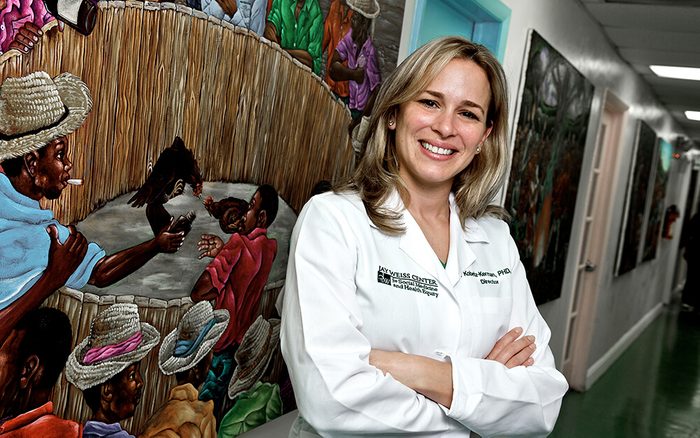I Spotted My Own Cancer in the Mirror—and It Saved My Life

It's not every day that a cancer doctor spots her own cancer in the mirror—but that's exactly what happened to Erin Kobetz in 2004. Read on to find out how her thyroid cancer diagnosis changed her life in ways she couldn't have predicted, for the better
Everyone checks the mirror in the morning before heading out the door; no one expects it to save their life. It did for Erin Kobetz, PhD, MPH, a cancer researcher at the University of Miami.
Six weeks into her new job at the University, Kobetz noticed something odd about her throat as she got ready for work: “There’s no real way to explain it, other than my neck looked funny,” Dr. Kobetz recalls. Alarmed, she immediately made an appointment with her primary care physician. Her doctor agreed that her neck appeared unusual—but couldn’t say why.
Dr. Kobetz had a history of thyroid trouble: “I developed Hashimoto’s thyroiditis after the birth of my son, which is an autoimmune condition that can make the thyroid appear lumpy.” But she felt this was something else. “Luckily, my doctor believes that sometimes patients actually know their bodies, and she trusted my intuition that something just didn’t look or feel right,” she continues.
Although the risk of cancer is elevated in patients with Hashimoto’s thyroiditis, it’s an extremely rare complication. Dr. Kobetz was the exception: A neck ultrasound revealed that her thyroid was cancerous, and her medical team began the treatment protocol—total removal of her thyroid gland along with the lymph nodes in her neck, and treatment with radioactive iodine. (These are the thyroid cancer symptoms you should never ignore.)
The treatment was swift and effective, and it led to her remission. But the ordeal left a lasting mark on her emotionally. “When anyone experiences a life-changing event such as cancer, you have a heightened sense of awareness about your lack of control,” she explains.
To regain some semblance of control, Dr. Kobetz turned to leading a healthier lifestyle. “I became extremely physically active and began a very healthy diet. You can’t survive a cancer diagnosis and not become aware of your own mortality on a daily basis,” she continues. For Dr. Kobetz, the experience led to self-reflection: “I asked myself who I was going to be now, and how was I going to live my life—we only get one.”
Not only did Dr. Kobetz’s diagnosis impact her personal outlook, but it also gave her a new perspective on her work. “I no longer wanted to pursue science that was only statistics-based, because I had been the statistic myself,” she explains.
Dr. Kobetz was awarded a grant by Cigna through its World of Difference program that enables her to continue serving the community of Little Haiti in Miami. Her goal is to research the increased risk of cervical cancer among women in the community, who often turn to herbal remedies that may do more harm than good. “My story provides a common ground with these women—and a shared humanity. My cancer changed my work—it was no longer professional, but personal,” she says.
Next, check out the best beauty and wellness treatments for people with cancer.




